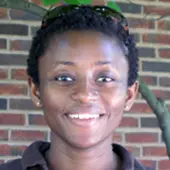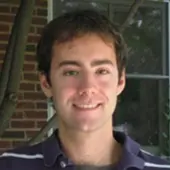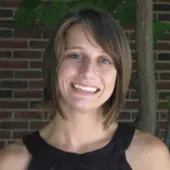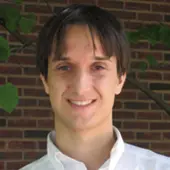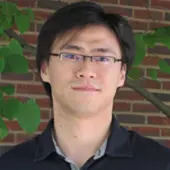2010-2011 Cluster Fellows
J. Marian Diop
Department/Program: Chemical & Biological Engineering
Faculty Advisors: John Torkelson, Walter P. Murphy Professor of Chemical and Biological Engineering and Materials Science and Engineering
Status of Studies: Second Year
What is your area of focus at Northwestern?
I like to think of myself as a budding polymer scientist. My research group, a Polymer Science and Engineering group, mostly focuses on polymers in nano-confined geometries, gradient copolymers, and solid-state shear pulverization; my work is in solid-state shear pulverization. All of my research is essentially based on studying the effect of solid-state processing on the properties of polymer systems. Depending on the type of system I study effects such as reaction chemistry, mechanical properties, degradation, and rheological properties.
Brief personal history:
I was born and grew up in Ghana, West Africa. I went to Tufts University for my undergraduate education in Chemical and Biological Engineering. During the summer of 2008 I worked as a Process Engineering Intern at Nova Chemicals, Monaca, PA. Part of my assignment as an intern was to work on a waste -water management Project with the Research and Development facility. It was during this time that I decided that to get a PhD and hopefully return to industry and work in research and development.
Why were you interested in becoming a Cluster Fellow?
My research, to some extent, involves the study of sustainable materials. Beyond this, I realized that I had a very limited knowledge of energy and sustainability in general. It was my desire to expand on this knowledge that made me interested in becoming a Cluster Fellow.
James Riley
Department/Program: Materials Science & Engineering
Faculty Advisor: Lincoln LauhonStatus of Studies: Completed PhD
What is your area of focus at Northwestern?
I study the composition of GaN nanowires. These wires are incredibly small—they have diameters about 1000 times smaller than the width of a human hair. By obtaining information about the distribution of impurities within the wires using an experimental technique called atom probe tomography, I can provide information that could help improve the efficiency of light-emitting diodes (LEDs) made using these nanowires. It has been hypothesized that by the year 2025 efficient LEDs could reduce lighting energy use in the US by 50% and lower the amount of carbon emissions by 28,000,000 tons per year.(1) (1.) Solid-State Lighting R&D at Sandia: Energy Efficient Lighting using Semiconductor Technology. Washington DC: Sandia National Laboratory, 2004. Print.
Brief personal history:
I was raised in Glenview as the oldest of three boys. I moved east and studied physics with a minor in philosophy at Boston College, and graduated Magna Cum Laude in 2009. I have since returned to Chicago to pursue an engineering PhD.
Why were you interested in becoming a Cluster Fellow?
Through this Cluster Fellowship I hope to gain a broader understanding of how my research can help combat energy and climate change problems.
The highlights of this year's experience were:
I thoroughly enjoyed the class “Topics in Contemporary Energy and Climate Change” taught by Professor Yarrow Axford. This class taught me the causes and dangers of climate change and also described the solutions that can be employed to mitigate global warming.
This experience has enriched my time here at Northwestern by:
During my time as a Cluster Fellow I have enjoyed interacting with professors and peers who are as interested in sustainability as I am.
My future plans include:
After I finish my PhD I hope to obtain a position as a research and development scientist or perhaps even become an entrepreneur and start my own company focusing on energy technology.
Publications:
- J.R. Riley, R.A. Bernal, Q. Li, H.D. Espinosa, G.T. Wang, L.J. Lauhon. “Atom Probe Tomography of a-Axis GaN Nanowires: Analysis of Non-Stoichiometric Evaporation Behavior,” ACS Nano 2012, 6, 3898–3906.
- J.R. Riley, D.E. Perea, L. He, F. Tsui, L.J. Lauhon. “Correlation and Morphology of Dopant Decomposition in Mn and Co Codoped Ge Epitaxial Films,” J. Phys. Chem. C 2012, 116, 276–280.
Recent Awards and Honors:
- First Prize, Best Student Presentation, 2012 Symposium on Surfaces and Heterostructures, TMS Conference (2012)
- National Defense Science and Engineering Graduate (NDSEG) Fellowship (2011-2014)
- Dow Sustainability Innovation Student Challenge Award Winner (2011) - $10,000 awarded for proposal entitled “A Sustainable Photolithography Solution for the Semiconductor Industry.”
- Best Student Oral Presentation, Electronic Materials Conference (2010)
Updates:
Since June 2012, Jim has presented three conference talks, and will be presenting one poster and one talk at the end of August. In addition, he recently submitted a paper to Nano Letters discussing 3-D composition mapping and correlated optical characterization of a nanowire light emitting diode array.
Katherine Sacks
Department/Program: Journalism, Magazine and science reporting concentrations
Faculty Advisor: Abigail Foerstner
Status of Studies: Third Year
What is your area of focus at Northwestern?
During my time at Medill, I have focused on food science reporting, so finding the link between food writing, health consciousness and scientific research. For six months I covered this topic in Chicago as the food science reporter for Medill News Service. I also worked with a group of students to create a new interactive magazine called Beaucoup, for which I reported and wrote two food-related stories.
Brief personal history:
The daughter of an Army officer, I spent my childhood moving around the U.S. and I was lucky enough to live in Germany for nine years. This traveling opened my eyes to the different cuisines and foods of many places and how other people live their lives and eat in a more sustainable way.
Why were you interested in becoming a Cluster Fellow?
I have a great interest in and desire to promote sustainable food systems, and learning about how this topic fits into the greater issues of climate and sustainability.
The highlights of this year's experience were:
Learning about climate change and really gaining an understanding of the issues involved in climate change.
This experience has enriched my time here at Northwestern by:
Allowing me to meet students outside of Medill, and giving me a more rounded out education while here.
New things I learned about myself or others this year:
How varied my interests are, and how much I contribute to energy use, as well as things I can do to encourage others to be more conscious of their energy use and choices.
My future plans include:
Working for a magazine writing about food or environmental issues.
Christopher Eli Wilmer
Department/Program: Chemical & Biological Engineering
Faculty Advisor: Randall Q. Snurr,
John G. Searle Professor of Chemical and Biological EngineeringStatus of Studies: Fourth Year
What is your area of focus at Northwestern?
I design materials that absorb greenhouse gases (inexpensively!). Materials science has gotten to the point where we are able to create an enormous variety of materials with atomic scale precision. The challenge now is to choose the right material, out of the sea of possibilities, for the desired application. By using supercomputing resources, I am developing software that can screen hundreds of thousands of materials with short but accurate physical simulations. Once the best materials are identified, I will build and test them in the laboratory. Ultimately, the best material will be used in a filter in the smoke stacks of coal power plants in an effort to mitigate or reverse climate change.
Brief personal history:
I grew up in Toronto, Canada, born to parents of Polish descent. After being inspired by the writings of Ray Kurzweil and Eric K. Drexler in high school, I pursued a nanoengineering degree from the University of Toronto in the Engineering Science program. Afterwards I came to Northwestern to pursue research in the area of nanomaterials. Since coming here I’ve become increasingly interested in attempting to solve humanitarian and social problems through innovation competitions.
Why were you interested in becoming a Cluster Fellow?
My research is very closely related to sustainable energy production. Fossil fuels are a very practical form of energy for a variety of reasons and it would make sense to continue using them as long as we can responsibly filter the waste products.
The highlights of this year's experience were:
I had the privilege of having a packed audience room when I spoke at the fall American Institute of Chemical Engineers conference this year (mostly thanks to the fame of the previous speaker, thank you). I met many creative and intelligent engineers, which made me optimistic about solving tomorrow’s problems.
My future plans include:
Find the miracle material that will soak up all of the greenhouse gases!
Updates:
Chris recently accepted a faculty position at the University of Pittsburgh (wilmerlab.com) and saw his start up company NuMat Technologies close a $2 million seed investment round. Chris was also featured in Forbes 30 Under 30 list of rising stars in the energy sector. Chris is still an assistant professor at the University of Pittsburgh. Their lab wins awards here and there. His lab is at www.wilmerlab.com
Rui Zhou
Department/Program: Mechanical Engineering
Faculty Advisor: Jian Cao,
Associate Vice President for Research; Cardiss Collins Professor of Mechanical Engineering and (by courtesy) Civil and Environmental Engineering and Materials Science and Engineering; Director, Northwestern Initiative for Manufacturing Science and Innovation (NIMSI)Status of Studies: Final Year of PhD
What is your area of focus at Northwestern?
I’m developing an innovative micro manufacturing system which has a potential impact on improving the energy efficiency. 33% of world energy is consumed by manufacturing. The promising micro manufacturing technology, which bridges macro-scale production and nano-scale enabling science, will effectively increase energy efficiency and lead to many launches of applications in the areas of renewable energies.
Brief personal history:
I was born in Nantong, Jiangsu, China. I received my B.S. in Mechanical Engineering from Shanghai Jiao Tong University, and in the meantime, spent one year in Purdue University as an exchange student supported by GEARE (Global Engineering Alliance for Research and Education) program. This one year experience as a global researcher broadened my horizons and cultivated my hunger for state-of-the-art technology. The reputation of NU for its cutting edge research, together with its astonishing beauty, led me to the PhD program of Mechanical Engineering at Northwestern University.
Why were you interested in becoming a Cluster Fellow?
The Fellowship offers me an opportunity to work and interact with a group of talents from different departments with different academic interests and backgrounds. I am excited to advance the Institute’s mission to create new science, technology, and policy for sustainability and energy. Meanwhile, it is a good break from my own research and good opportunity to broaden my knowledge.
The highlights of this year's experience were:
During the past year, I passed my Ph.D proposal defense and became a Ph.D candidate. I spent one month as a visiting scholar in IIT Kanpur, India doing research and learning India culture. I trained one undergraduate student and helped him win the Undergrad Research Award. I got three journal paper published and was awarded the Terminal Year Cabell Fellowship.
This experience has enriched my time here at Northwestern by:
Being a part of ISEN I have learned an extensive amount about the climate change and the energy crisis, have been able to get involved in organizations that are trying to make a difference, and have broaden my exposure to experts and knowledge in the fields of renewable energies and sustainability. All of these help me form a deeper understanding of the drastic debate on climate change and help me make my own judgment.
New things I learned about myself or others this year:
I realized my passion for developing renewable energy and increasing energy efficiency. I have learned that I would like to have a job that relates to energy or sustainability.
My future plans include:
I will try to get involved in companies or programs that are trying to develop promising renewable energies or trying to improve the energy efficiency.
